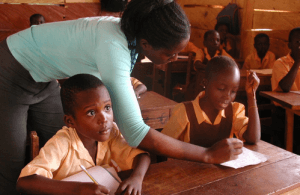Lively Minds, an NGO with a focus on ensuring that rural pre-school children develop the requisite intellect they need to thrive in school, has called on mothers to prioritize early childhood education.
This, according the NGO, was a crucial stage for human development.
Madam Alison Naftalin, the Chief Executive Officer (CEO) of Lively Minds who made the call at a Childhood Care and Education Dissemination programme, said mothers played key roles in the developmental process of their children, since 76 percent of a child's life was spent at home.
She said, the NGO was collaborating with the Ghana Education Service (GES), to enlighten mothers on health, nutrition and child safety issues among others, by running a monthly course for them to unlock the power of parents in rural areas, to impact the progress of their children.
Madam Naftalin, said there was the need to unearth promising paths to improve children's development.
She noted a research conducted by the Institute of Fiscal Studies and Innovation for Poverty Action Plan (IPA) Ghana had proven that the training programme had impacted significantly on the cognitive development and health in children, using a randomized evaluation among 80 rural schools.
"Half of these schools were randomly assigned to receive training and support from Lively Minds" she said.
The CEO said the findings suggested that the hybrid early childhood development programmes that simultaneously targeted homes and pre-school environments through parents, was a cost-effective way to improve early child education.
She said that the programme had impacted mothers positively, and had improved their self-esteem and risk of depression as they became more concerned about theirs wards education.
Mothers now pay regular visits to their ward's schools and interact with their teachers to know the progress of their children.
She commended the government for achievements made in the pre-primary education sector and the introduction of the Kindergarten system and a
Curriculum in line with evidence-based teaching practices required for the child.
